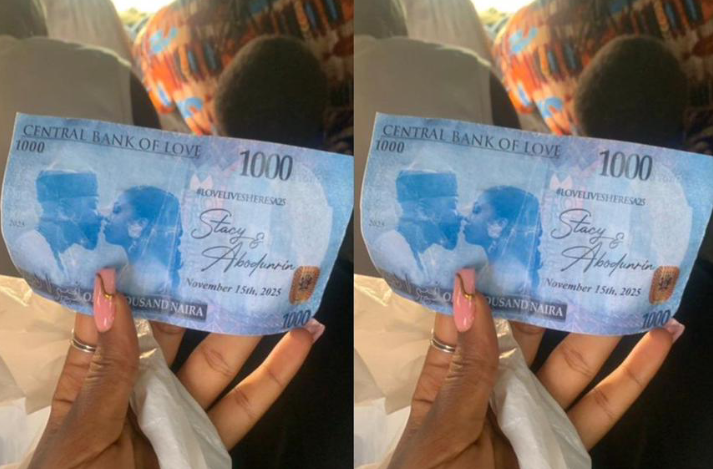
Lagos Commuter Shocked as Conductor Collects Newly-Circulated Fake ₦1000 Notes, Sparks Online Frenzy

In a bizarre twist to Nigeria’s growing concerns about currency fraud, a Lagos commuter has set social media on fire after revealing that a bus conductor was paid with what appears to be a newly designed—but completely fake—₦1000 note. The incident, shared by X user Hon. Jesugbemi, quickly went viral as Nigerians reacted with disbelief, anger, and dark humor over the boldness of the counterfeiters who produced what many now describe as “the most unserious fake currency ever seen.”
According to the viral post, the commuter was stunned when someone handed the conductor three crisp notes that looked like ₦1000 bills at first glance. But a closer look revealed the shocking truth: instead of bearing the standard designs of the Central Bank of Nigeria, the notes boldly displayed the words “CENTRAL BANK OF LOVE” and “DUSAND NAIRA”, along with playful symbols and unusual inscriptions. The date printed on the notes read November 15th, 2025, as though the creators planned to fool only the careless eye.
What made the situation even more outrageous was the casual way the notes were passed off during the early morning commute. The conductor allegedly collected the money without hesitation, possibly too busy managing passengers to inspect the details. It wasn’t until the commuter pointed it out that the absurdity of the situation came to light. By then, the person who paid with the fake money had already disappeared into the bustling Lagos traffic.
The images shared online were both alarming and hilarious. In place of the eagle, coat of arms, and watermarks that usually decorate Nigerian currency, the fake notes sported hearts, decorative fonts, and phrases that looked like something straight from a Valentine’s Day card rather than legal tender. Yet, at a quick glance—especially in a chaotic danfo environment—the blue hue and general layout could easily deceive someone in a hurry.
The reactions on social media came swiftly. Many Nigerians expressed shock that counterfeiters were growing more brazen, not only producing fake currency but printing versions that openly mock the system. Others blamed the harsh economic climate, joking that even fraudsters had run out of seriousness. Comments ranged from “Only in Nigeria” to “Even counterfeiters don tire,” while some insisted the conductor must have been too stressed to care.
But behind the humor lies a more troubling reality. Counterfeit currency circulation has been on the rise, especially in major cities where high-volume cash transactions make quick verification difficult. Bus conductors, street vendors, and small business owners are often the most vulnerable, losing money they can’t afford to replace. With inflation still pressuring the economy, losing even a single ₦1000 note is no small matter—not to mention three at once.
Security experts note that the simplicity and unserious nature of these fake notes could serve one of two purposes: either the counterfeiters are experimenting with designs to see how much they can get away with, or they intended to scam only low-verification environments like crowded buses, where the focus is on speed rather than accuracy. If someone can successfully pass such obviously fake money, it may embolden them to produce more convincing versions later.
The Central Bank of Nigeria has yet to comment on the incident, but past advisories have urged the public to familiarize themselves with security features on naira notes, especially watermarks, security threads, raised print, and color-shifting elements. In this case, those features were glaringly absent, replaced by decorative elements that should immediately raise suspicion. Still, the fact that the notes were accepted even for a few seconds highlights how chaotic public transportation exchanges can be.
Passengers who witnessed the scene say the conductor’s reaction shifted from anger to disbelief, then finally to resignation. Reports suggest he held up the fake note to the bus, shouting in frustration as passengers laughed incredrollously. Someone allegedly told him, “Oga no vex, even fake money don sabi cruise now,” adding more humor to a moment that cost him real income.
The incident also sparked fresh conversations about the need for cashless payment options in public buses. Several commuters argued that digital payments would eliminate issues like this completely. However, others pointed out the ongoing challenges of unstable networks, unreliable POS agents, and resistance from both drivers and passengers who prefer the convenience of cash.
For now, the fake “CENTRAL BANK OF LOVE” note has become a trending topic online, with many creatives turning it into memes, skits, and jokes. But beneath the laughter, the story reflects the everyday frustrations of Nigerians navigating an economy where fake currency, rising costs, and uncertainty are increasingly becoming part of daily life.
As the discussion continues to spread, commuters are urged to check their cash carefully, especially in fast-paced environments like bus parks and busy junctions. Counterfeiters may be getting creative, but awareness remains the strongest line of defense. And for the unlucky conductor who unknowingly accepted three “DUSAND NAIRA” bills, the lesson is painfully clear: in today’s Nigeria, even money needs a second look.
With the incident gaining more attention, many hope it will push authorities to intensify efforts against counterfeiters and strengthen public awareness. Until then, Lagos commuters will likely think twice before accepting any ₦1000 note that looks a little too colorful, too smooth, or too romantic for comfort.
The viral story serves as both comic relief and a cautionary tale—a reminder that in a country full of hustle, ingenuity, and survival instincts, not everything that looks like money is actually money. And sometimes, as this conductor learned the hard way, reality can be stranger than fiction.


